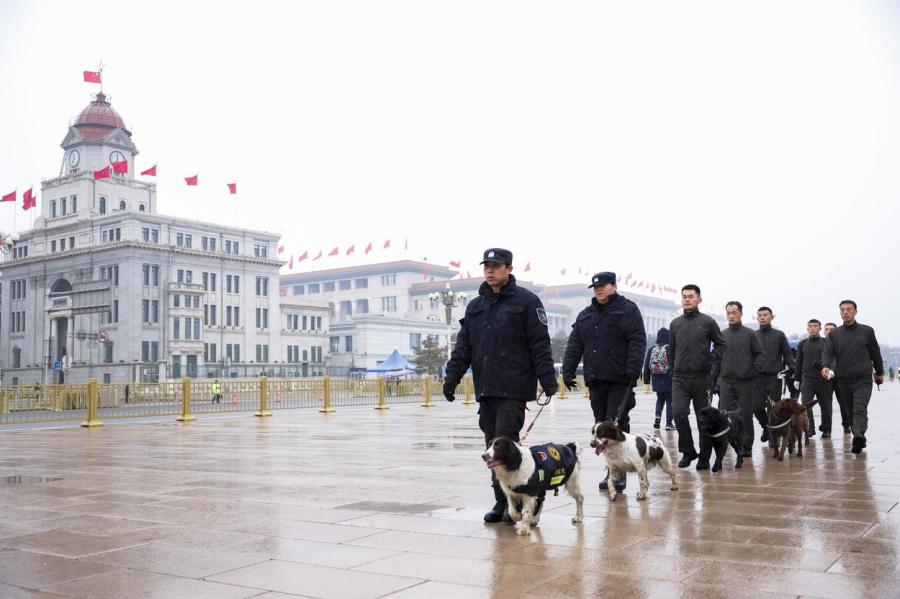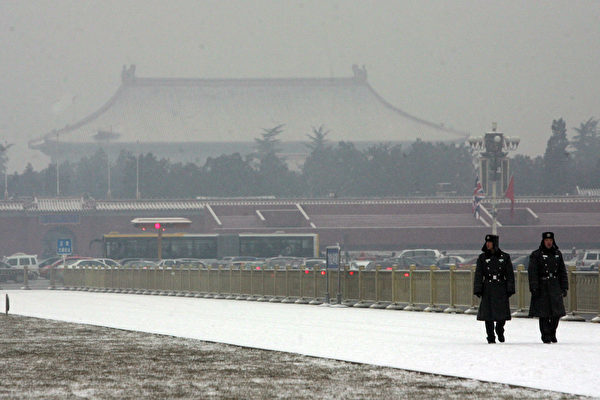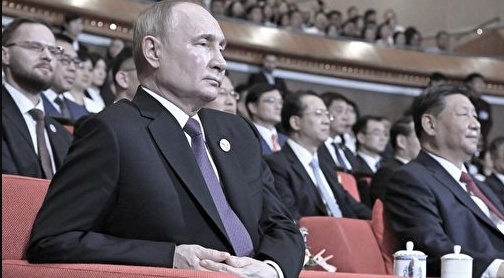File photo: Plainclothes security personnel walk outside the Great Hall of the People during the opening ceremony of the National People's Congress in Beijing, China, on March 5, 2024. (Photo by Lintao Zhang/Getty Images)
[People News] The tensions between China and Japan have escalated once again. The Chinese Communist Party's embassy in Japan recently invoked the 'enemy country clause' from the United Nations Charter, asserting that this clause grants the victorious nations of World War II the authority to combat fascism. In response, Japan stated that this clause is outdated. Does this suggest that Beijing is contemplating military action against Japan?
Following his visit to three Central Asian countries, Chinese Foreign Minister Wang Yi gave an interview to mainland media, offering his latest comments on China-Japan relations.
According to a report on the official website of the Chinese Ministry of Foreign Affairs dated November 23, Wang Yi criticised Kato Sanai, stating that she 'made inappropriate remarks, crossing a red line that should not be crossed.'
He expressed astonishment at Kato Sanai's comments regarding 'Taiwan's situation,' claiming that Japan should engage in deep reflection on its historical actions and crimes. He further asserted that if Japan persists in its current approach, Beijing 'has the right to reassess Japan's historical crimes and the responsibility to firmly prevent the resurgence of Japanese militarism.'
As the top leader of the Chinese Communist Party's foreign affairs apparatus, Wang Yi's reiteration of this position undoubtedly raises the stakes in the China-Japan dispute.
The 'Taiwan situation' remarks refer to Kato Sanai's statement in the Japanese parliament on November 7, indicating that if Taiwan were attacked by the Chinese Communist Party, it could provoke a military response from Japan. Following this, on the night of November 8, the Chinese Consul General in Osaka, Xue Jian, posted on X, suggesting a 'decapitation' of Kato Sanai, which has led to a growing controversy that has extended into trade, tourism, and cultural relations between the two nations. As a result, China-Japan relations have reached a new low.
Last Friday, the Beijing authorities sent a letter to United Nations Secretary-General António Guterres. The letter clearly stated, "If Japan intervenes militarily in the Taiwan Strait situation, it will be considered an act of aggression, and China will firmly exercise its right to self-defence as granted by the United Nations Charter and international law, resolutely defending its national sovereignty and territorial integrity." This letter was also distributed to all member states of the United Nations, leading to strong protests from both Japan and Taiwan.
In response to Beijing's letter to the United Nations, the Japanese Ministry of Foreign Affairs stated last Saturday that it was "completely unacceptable" and reaffirmed Japan's commitment to peace.
On Sunday, the Ministry of Foreign Affairs of the Republic of China issued a statement condemning the letter, highlighting that its content "is not only unreasonable but also maliciously distorts historical facts, and violates Article 2, Paragraph 4 of the United Nations Charter, which prohibits the use of threats or force in international relations."
The statement further emphasised that "Taiwan is a sovereign and independent country, not subordinate to the People's Republic of China; this is not only the objective status quo in the Taiwan Strait but also a fact recognised by the international community."
Additionally, there was a minor incident regarding Beijing's request for the United Nations to endorse the notion that "Taiwan is an inseparable part of China."
A report, allegedly from CCTV, circulated online, stating that during a routine press conference at the United Nations on November 17, a CCTV reporter questioned UN Secretary-General spokesperson Stéphane Dujarric about comments made by Japanese politician Takashima Sōmei regarding Taiwan. Dujarric emphasised that the United Nations' official stance on the Taiwan issue is based on General Assembly Resolution 2758.
The CCTV reporter then followed up by asking, "So the formal terminology in official documents remains 'Taiwan is a province of China,' is that correct?"
Diyalike stated that the United Nations' official position on Taiwan remains unchanged, and all UN member states should support and respect the United Nations Charter.
However, CCTV distorted the facts, turning a question from a CCTV reporter into a statement attributed to Diyalike, claiming that 'Taiwan is a province of China.'
Following this, Beijing referenced the 'enemy state clause' from the United Nations Charter, which sparked a renewed exchange of sharp words between China and Japan.
On November 21, the Chinese Embassy in Japan posted on social media, asserting that if Japan were to initiate an invasion, given its status as an enemy state during World War II, Beijing has the right to invoke Articles 53, 77, and 107 of the United Nations Charter to take military action against Japan directly, without needing authorization from the UN Security Council. This statement was interpreted by many as a specific and escalated military threat from Beijing to Japan, aiming to apply pressure on Japan at the level of international law.
In response, on November 23, Japan's Ministry of Foreign Affairs addressed this on Facebook, stating that, regarding the 'old enemy state clause' in the United Nations Charter, a resolution was passed at the UN General Assembly in 1995 that clearly indicated this clause is outdated and has effectively lost its validity. This resolution was adopted by an overwhelming majority, with Beijing also voting in favour.
The Ministry further noted that at the 2005 UN Summit, the UN General Assembly passed another resolution affirming that all member state leaders are united in their determination to remove references to 'enemy states' from the United Nations Charter, and Beijing also agreed to this consensus. Therefore, any claims that these outdated clauses are still valid contradict the position of the United Nations.
However, mainland Xiaofenhong believes that the 'enemy country clause' remains valid, as it is still included in the text of the 'United Nations Charter' and has not been removed. Xiaofenhong asserts, 'It is our duty to break the fangs of Japanese rightists, and this power is granted to us by the United Nations Charter.'
So, is the 'enemy country clause' still effective? Let's take a look back at history to understand its origins, historical context, evolution, and current status.
First, what is the reason for this clause?
Article 2, Paragraph 4 of the 'United Nations Charter' prohibits the use of force in international relations. However, the Charter was drafted during the San Francisco Conference, which began on April 25, 1945, and was signed by 51 founding member countries at the closing meeting on June 26, 1945. At that time, World War II had not yet concluded, so to avoid disrupting the ongoing anti-fascist war and to establish a legal framework to prevent the former Axis powers from threatening world peace again, the four major powers—China, the United States, the United Kingdom, and the Soviet Union—decided to include a clause for 'special treatment' of the former Axis powers in the Charter. This would allow military action against them to be taken when necessary without requiring Security Council authorisation. This was the primary purpose behind the establishment of the 'enemy country clause' at that time.
Article 53 of the Charter identifies enemy countries as 'the nations that were enemies of any signatory nation of this Charter during World War II,' specifically naming seven countries: Japan, Germany, Italy, Hungary, Romania, Bulgaria, and Finland.
The specific provisions include Article 53, which allows regional mechanisms or organisations (such as the Anti-Fascist Alliance at the time) to take direct enforcement measures, including military actions, against 'enemy countries' that launch aggression against them, without the authorisation of the Security Council.
Article 77 places 'territories separated from the enemy countries of World War II' under the United Nations trusteeship system, enabling the victorious countries to manage the territorial affairs of the enemy countries, such as through trusteeship or division of territories. For instance, Japan's Ryukyu Islands were incorporated into this trusteeship system.
Article 107 focuses on confirming the legality of actions taken by the victorious countries against the enemy countries of World War II, allowing them to take military action directly against defeated countries that resume aggressive policies.
In reality, this 'enemy country clause' has never been utilised since its inception. Following World War II, the Cold War emerged, and these seven enemy countries were absorbed into the spheres of influence of the United States and the then Soviet Union, signing mutual defence treaties. Consequently, any attempt to invoke the enemy country clause to take military action against Japan or Germany was impossible, effectively rendering this clause void.
Since the 1990s, with the conclusion of the Cold War and the reunification of East and West Germany, the former enemy countries have begun efforts to completely abolish this 'discriminatory' clause.
The year 1995 marked the 50th anniversary of the founding of the United Nations and the 50th anniversary of the end of World War II. During the United Nations General Assembly held on December 11, Resolution 50/52 was adopted, officially recognising that the "enemy state clause" in the UN Charter is outdated. The resolution called for the initiation of an amendment process to remove these clauses from the Charter and encouraged member states that had not yet established diplomatic relations with the relevant former enemy states to normalise their relations as soon as possible. The resolution passed with 122 votes in favour, 0 against, and 6 abstentions. By the year 2000, in fact, no UN member states remained without diplomatic relations with these seven former enemy states or were in a "state of war" with them.
It is important to note that this resolution does not have the legal authority to amend the Charter. However, on the same day, the UN also adopted Resolution A/RES/50/80, which called for the "enemy state clause" to be regarded as invalid in international practice. It was announced that these two resolutions together form the framework for global action in 1995.
At the United Nations Summit held from September 14 to 16, 2005, the "Outcome Document of the 2005 World Summit" was adopted. This document explicitly decided to remove references to "enemy states" from the Charter. Ultimately, the resolution was adopted unanimously, but due to the complexity of the amendment process outlined in the Charter, all countries considered it a non-urgent matter during the meeting.
Amending the United Nations Charter, as stipulated in Article 108, requires not only the unanimous consent of the Security Council but also the approval of two-thirds of all member states, along with the endorsement of all permanent members and two-thirds of the member states following their respective constitutional procedures. The process is overly complex, and no country is willing to invest political capital in a clause that has long been rendered obsolete. Consequently, although there is unanimous agreement to remove it, the amendment process has not been formally addressed, leaving the term 'enemy states' still present in the Charter's text.
This has become the focal point of current debates. While the clause has been effectively abolished, this 'charter fossil' remains in the United Nations Charter as of 2025, requiring high political costs to remove. Thus, it has turned into a grey area that Beijing can exploit for geopolitical manoeuvring.
(First published in People News)
△











News magazine bootstrap themes!
I like this themes, fast loading and look profesional
Thank you Carlos!
You're welcome!
Please support me with give positive rating!
Yes Sure!